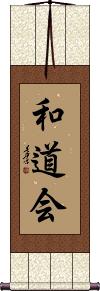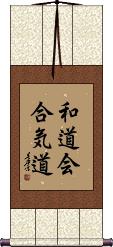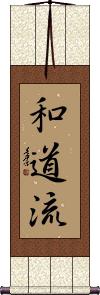Many custom options...
And formats...

Wado-Kai in Chinese / Japanese...
Buy a Wado-Kai calligraphy wall scroll here!
Personalize your custom “Wado-Kai” project by clicking the button next to your favorite “Wado-Kai” title below...
Wado-Kai
Wado-Kai is used as a title for styles of Karate and Aikido.
Breaking down the characters into the proper Japanese Romaji, you have “wa dou kai” or “wa dō kai.” The meaning is roughly-translated as “Harmony Way Club” or “Peace Method Association.” The first Kanji should probably be read as harmony, rather than peace in this case.
See Also: Wado-Ryu
Wado-Kai Aikido
Wado-Ryu
Style of Karate or Jujitsu
和道流 or Wado-Ryu is a style of Karate or Jujutsu (Jujitsu).
Note: Many will argue whether this is a style of Karate or Jujutsu.
While some find Wado-Ryu similar to Shotokan Karate, enough differences exist in perspective and technique that it stands by itself.
Breaking down the characters into the proper Japanese Romaji, you have “wa dou ryuu” or “wa dō ryū.” The meaning is roughly-translated as “Harmony Way Style” or “Peace Method Style.” The first Kanji should probably be read as harmony rather than peace in this case.
See Also: Wado-Kai
Wado-Ryu Karate
The following table may be helpful for those studying Chinese or Japanese...
| Title | Characters | Romaji (Romanized Japanese) |
| Wado-Kai | 和道會 和道会 | wa dou kai / wadoukai / wa do kai |
| Wado-Kai Aikido | 和道會合気道 和道会合気道 | wa dou kai ai ki do wadoukaiaikido wa do kai ai ki do |
| Wado-Ryu | 和道流 | wa dou ryuu wadouryuu wa do ryu |
| Wado-Ryu Karate | 和道流空手 | wa dou ryuu kara te wadouryuukarate wa do ryu kara te |
| In some entries above you will see that characters have different versions above and below a line. In these cases, the characters above the line are Traditional Chinese, while the ones below are Simplified Chinese. | ||
Successful Chinese Character and Japanese Kanji calligraphy searches within the last few hours...







